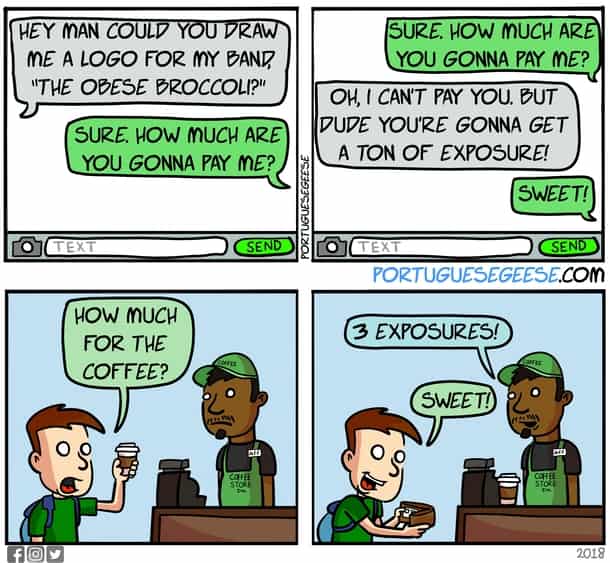Should You Work for Free? 5 Scenarios You’ll Be Tempted To
For some reason, this question always seems to pop up in freelancing circles. A common response from experienced freelancers is "never work for free!", but I think there are situations where it does make sense to offer free work.

Ah, the age old question that virtually every freelancer has had to grapple with at some point – usually early on – in their career:
Should I work for free?
Ask this question in any freelancing group on Facebook or Reddit and you’ll have no shortage of people offering strong opinions. For some reason this question really strikes a nerve in the freelancing community.
The answer to the question though, in my opinion, isn’t so black-and-white.
In some cases, yes, I think it’s a good idea to work for free.
In other cases – perhaps most cases – I don’t think working for free is a smart decision.
But before I dive into the pits of controversy, here are some starting assumptions:
- Your work has value. Unless you are totally incompetent. But in that case, why are you even offering whatever you’re offering?
- There should always be an exchange of value for your work. In most cases it is money paid for services rendered, but there are other forms of value outside of money. I’ll cover those later.
- You are most likely a new freelancer. Someone with a pipeline full of prospects is almost never going to work for free.
The most common (bad) reasons for working for free:
1. You’ve been offered “exposure”

This is a slick move that is often used by companies that are looking for cheap labor. In nearly every case, the promise of exposure doesn’t end up amounting to much. You need paying clients, and the myth of “exposure” rarely leads to paying clients. You can’t pay your mortgage with exposure, you can’t buy food with exposure, you can’t really do anything with exposure.
If the prospective client truly has a substantial audience and Some of this comes down to how in tune your spidey-senses are, but in general, if you can’t form a very clear path in your mind where exposure = imminent client acquisition, it’s best to stay away.
2. You’re not comfortable charging clients yet
As a new coach, designer, writer, artist, or whatever you are, it’s always nerve racking the first time you ask someone to pay you money for something. Most 9 to 5 employees aren’t used to having these conversations with prospects, which leads a lot of new freelancers to feel like they aren’t “ready” yet.
OR
3. You want to add a high status client to your portfolio
A high status client can afford to pay you for your work. If they say they can’t, something isn’t right there. If one of these prospective clients suggests free work, run for the hills.

How to Become a Freelance Writer
Six steps to a profitable freelance writing career.

How to Become a Virtual Assistant
A step-by-step guide to earning $25+/hr.
4. You are told it may lead to paid work with that client
More often than not, this is a classic bait and switch move that companies like to use to get free labor. If a company is suggesting this, it’s another major red flag. If they want you to work for free, how well do you think they are going to pay you when you finally have the “privilege” of doing paid work? Probably well below industry average since they already know you are willing to work for free!
“It could lead to paid work down the road” is a very wishy-washy of saying “we don’t want to pay for your work, but even if you do a great job, we want to leave ourselves an out to not hire you”. Stay away from this arrangement.
5. The client says there is no budget for the project
If there is no budget for a project now, there is basically zero chance of there magically being a budget for the project in the near future. There is no upside here to doing free work.
Have a tangible plan to capture the value of your work
If you are going to do free work for someone, it’s up to you to make sure there is still a fair exchange of value happening unless the work is for your mother or a charity close to your heart. Without capturing the value of your work, you aren’t actually moving yourself forward or accomplishing anything.
Besides money, there are other ways to get something out of your work:
- Experience
- A testimonial
- A portfolio piece
- A case study showing a transformation
- Asking for referrals
- Talking points for future sales calls or interviews
- Street cred
This is important. Always be thinking about how you can leverage the work you are doing, regardless of whether it’s free or paid.
How can you turn today’s work into opportunities for tomorrow?
The freelancers that routinely look at their work through this lens are the ones that end up being the most successful. Becoming a better freelancer is a lot more than just perfecting your craft; it’s about putting the whole “value puzzle” together.






